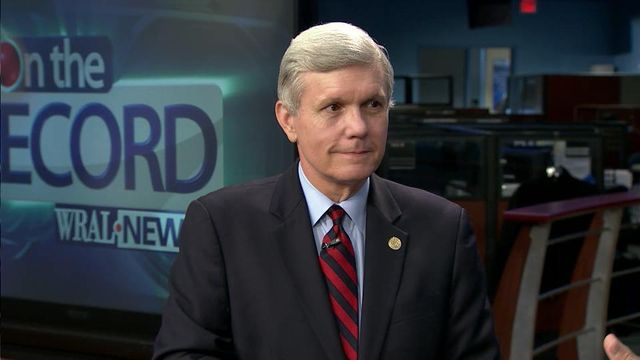Candidates bend truth while 'On the Record'
North Carolina's leading candidates for governor strayed from the strictly factual during their recent appearances on WRAL's "On the Record."
Posted — UpdatedThe following is a fact check of statements made by Dalton, a Democrat, and McCrory, a Republican, during their time with anchor David Crabtree.
Did Dalton veto Voter ID?
McCrory favors changing state law to require voters to show a photo ID when they go to the polls. It is a point where he and Dalton differ.
“If a voter ID is good enough to get into the governor’s mansion, or buy Sudafed, or to get into the Democratic National Convention, (for) which they required a voter ID ... then it’s good enough for the voters of North Carolina,” he said. McCrory added that showing an ID was “The same requirement to get a tattoo in the state of North Carolina.” And he said, “I’m very disappointed that both Walter Dalton and Beverly Perdue vetoed those efforts.”
McCrory makes several claims about where photo Identification is needed in this state:
Finally, while it's fair to say Dalton opposes photo ID for voting, it is not correct to say that he "vetoed" such a bill. As president of the Senate, Dalton didn't have the authority to block the legislation. And it is the governor, not the lieutenant governor, can veto legislation.
Would McCrory's tax plan hurt middle class?
McCrory does indeed talk about eliminating the corporate income tax in North Carolina and lowering the state's individual income tax. That would likely require some expansion of the sales tax base. Lawmakers have long talked about broadening the sales tax base – taxing more things – as a way to lower the sales tax rate. Dalton has taken the position that he opposes the expansion of the sales tax base.
McCrory's written tax plan is far from specific and he has not himself embraced a single tax reform approach. For this reason, it's hard to say that he favors moving to any one kind of tax.
Dalton points to appearances McCrory made with former Florida Gov. Jeb Bush. On those occasions, McCrory was very complementary of Florida's tax and regulatory environment. Florida doesn't have an income tax and relies heavily on sales tax. Still, in interviews both McCrory and his campaign staff have said that does not mean McCrory thinks North Carolina should adopt Florida's tax system in its entirety.
It is worth noting that when asked about taxes during his "On the Record" taping, McCrory focused on energy production. He specifically said that allowing on-shore and off-shore exploration for natural gas could both create jobs and tax revenue that would offset the need for other taxes.
Without more detailed understanding of McCrory's plans, Dalton's claim is impossible to prove true or false.
Which campaign is keeping secrets?
Dalton and his allies have attempted to seize the high ground in the transparency debate. Earlier this year, Dalton released his tax returns, and he has since challenged McCrory to do the same.
“He has refused to let people see his tax returns," Dalton said of McCrory during his "On the Record" appearance.
McCrory told Crabtree, “I’ve released my financial, everything financial of where I get my income, exactly as the lieutenant governor did while he was lieutenant governor and while he was head of the Senate budget committee.” He added, “My stocks, where I get my W-2 forms, who has paid me, that’s all been released."
So who's telling the truth? Both of them.
McCrory has declined to release his tax returns, a practice which has become fairly standard. Both Bush and New Jersey Gov. Chris Christie, who have campaigned for McCrory, released their tax returns as part of political campaigns.
Do taxes send jobs packing?
During his "On the Record" appearance, McCrory argued that North Carolina's taxes were driving companies out of the state.
“Just yesterday, a major business left the Charlotte area and moved across the border to South Carolina with several hundred employees. And part of it is because their tax rates are lower," McCrory said during his Sept. 21 interview.
A call placed to Shutterfly Wednesday afternoon was not immediately returned. McCrory appears to have drawn a broad conclusion on this one. It is not completely true.
• Credits
Copyright 2024 by Capitol Broadcasting Company. All rights reserved. This material may not be published, broadcast, rewritten or redistributed.






